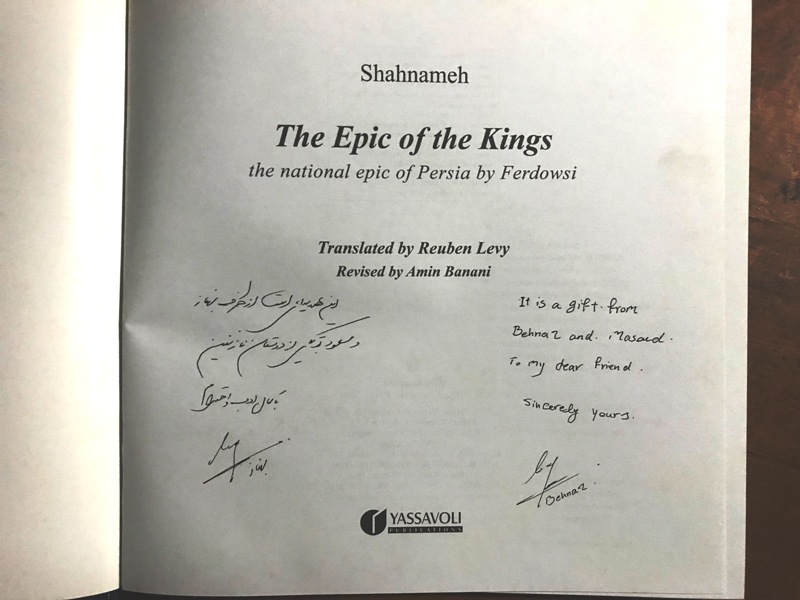Train Companions: Tehran–Mashhad, Iran
It was my own decision to travel semi-independently in Iran when I first visited the country in 2014. Tehran, Shiraz, Yazd, Esfahan, Kashan, Tabriz and Mashhad were the cities I was planning to visit, but in the middle, Tabriz was dropped because of logistical reasons. Being semi-independent traveler means my guide arranged my hotels and intercity transportation, but he would not accompany me throughout the entire trip. He only guided me in Tehran. I would also have intracity transportation and a guide in Mashhad. In other cities, I needed to take care of the logistical arrangement myself. However, my guide was responsible for me, so whenever I had questions or any issues during the trip, I could call or text him a message. That was the arrangement.
Being a first timer of Iran visitor and lacking the skill of local language, my whole trip really gave me a lot of experiences that have remained in my memories ever since. Here is about my night train trip Tehran-Mashhad.
Kashan–Mashhad
I had never heard of Kashan before, but as soon as I arrived in the city, I fell in love with its historic houses. My guide chose a historic guest house for my 2-night stay in Kashan. I would not know that there was a beautiful guest house behind the high wall when I arrived at my guest house. From outside it was just like a fortified house with one small entrance, but when I entered and explored inside the entire house, it was like finding rooms in a room. I was so amazed with both its architecture and interior.
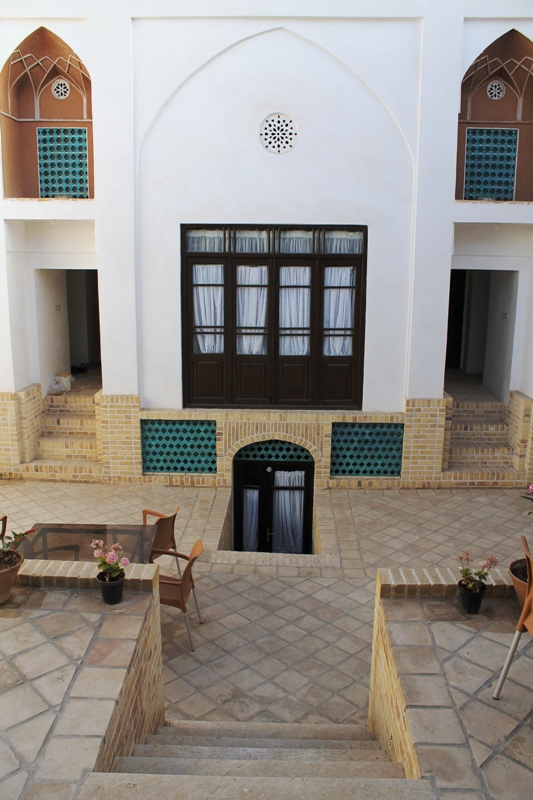
Tabatabaei House and Boroujerdiha House were two famous historic houses that I visited in Kashan–without a guide. Those historic houses dating back from the 18th and 19th century belonged to wealthy merchants of the city. I spent a half day in both of the houses just admiring their whole architecture. They were incredibly attractive. I was thrilled. In many beautiful architectural houses that I visited in Iran, I felt that I developed a connection with them. I could have stared at the beauty of the houses for hours. In short, I left my heart at Kashan.

Even though I fell in love with the captivating historic houses in Kashan, I could not stay long there. I needed to continue my journey to another city according to my schedule. My next itinerary showed that I would take a bus from Kashan to Tehran, and from Tehran I would take a night train to Mashhad.
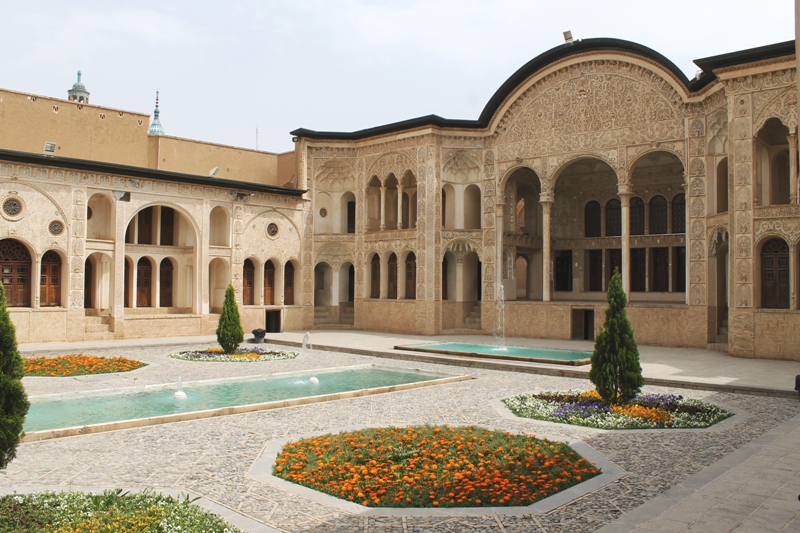
The taxi took me from my historic guest house to the bus terminal. The intercity terminal bus in Kashan was deserted. I just showed my bus ticket to a bus attendant and he took me to the respective bus. In Iran, a woman passenger who travels solo in an intercity bus will be seated with another woman passenger. So, the passenger who sat next to me was never an opposite gender, I would be paired with another woman passenger. That was convenient for me.

When I was boarding the bus, I texted a message to my guide and asked about the taxi fare from the bus terminal to train station Rah Ahan Square. I always asked my guide the taxi fare because I had no idea how much it was.
My bus trip from Kashan to Tehran was the shortest intercity trip I had taken in my visit to Iran in 2014. In less than two hours, I arrived at a busy bus terminal in Tehran. “Taxi?” I asked the bus attendant. Then the bus driver dropped me off near a line of taxis.
I got onto the taxi and said to the driver “Rah Ahan Train Station”. I just realized that Tehran was a very big city as I was riding in the taxi. There was a small incident when I got off the taxi. The driver argued that the taxi fare was not 100,000 Rial, but 200,000 Rial. Well, I just followed the recommendation from my guide. I didn’t want to debate with him, so I just gave him two 100,000 Rial banknotes and left.
While carrying my bag, I pulled my big luggage. The plan was to leave my big luggage to my guide so I could travel to Mashhad simply.
In addition to Mashhad, I would also visit its neighboring cities, Neyshaphur and Tus. My intention was to pay visit to the shrine of 8th Imam for Shiite Muslim, Imam Reza, in Mashhad and the tombs of Sufi in Neyshapur. I also wished to visit Tus, the birth city of Ferdowsi, a distinguished Persian poet who wrote a well-known epic Shahnameh. I was so excited with my last leg of Iranian journey. Those cities sounded ancient, inviting, and– except Mashhad–unknown.
Mashhad is one of the holy cities in Iran where pilgrims come to visit the shrine of Imam Reza. I had not been to any Islamic holy city. The only holy city that I had visited was Amritsar in Punjab, India. Amritsar is the holy city of Sikhs. So the term Islamic holy city incited me, I wanted to experience and see how it was.
Night Train
Rah Ahan train station was busy with many passengers. I looked around. I didn’t see any foreign tourists like me. I stood under a digital, big screen that showed the train schedule. However, it was written in Farsi. I had no idea what it was. I wanted to check my train, but the counter was not opened.
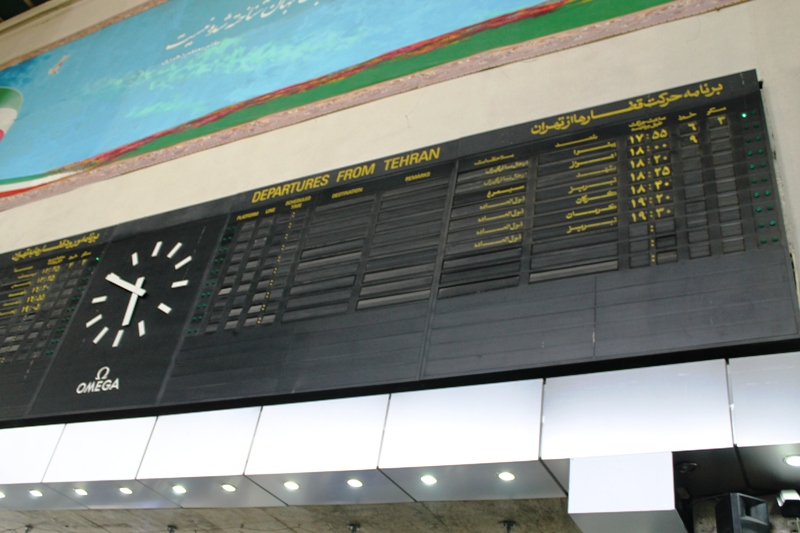
While waiting for my guide, I was just walking around the station. The seats in the waiting area were fully occupied. Many women wore full hijab and long black dresses, it looked like they were the pilgrims. While I bought some snacks in a small shop my phone was ringing, it was my guide, he was already in the station.
“Ms Kamah, there you are,” he grinned when we met. “Your train will leave soon, we can go inside,” he said. I gave him my big luggage. The crowd under the digital screen was getting bigger.
We entered an area where there were also rows of passengers sitting, I guess it was a boarding area but it was not as cramped as outside. As a foreign passenger I needed to get an extra check. My guide accompanied me to a small room in the corner where two young security officers in military uniform were waiting. They checked my ticket and passport and my guide said something to make a point that I was his client. One officer took a look at me closely to make sure the photo on my passport matched with my face. He asked my destination. “Mashhad,” I answered. I was glad that my guide accompanied me otherwise it would be a little trouble as I didn’t know the language. The officers let me go.
“I am accompanying you until boarding in the train,” my guide said. Other passengers also moved to the same train. I felt lost in the middle of the crowd, I just followed my guide. We took the escalator up and down until we arrived at the train tracks.
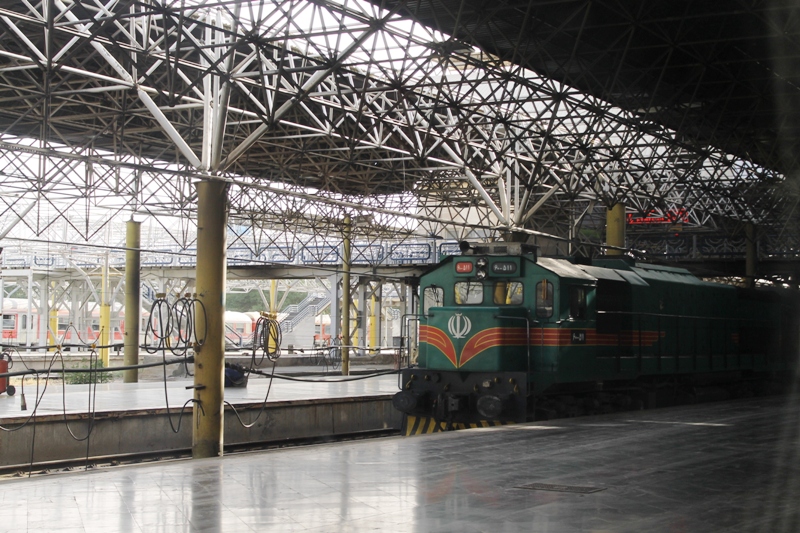
On board, he asked the train attendant while checking the compartments. Most of them were occupied by a group of families or friends. Then there was a compartment with a family: a man, a woman, and two young girls. My guide said something to them, and they welcomed me. He said I could go in that compartment. I took a seat. But not over five minutes, he came back and asked me to move to another compartment. “There is a compartment for women,” he added. He had checked another compartment and found one that was occupied by a young woman and her little son only. “This is a women compartment,” he said gladly. We said goodbye and he wished me a happy journey.
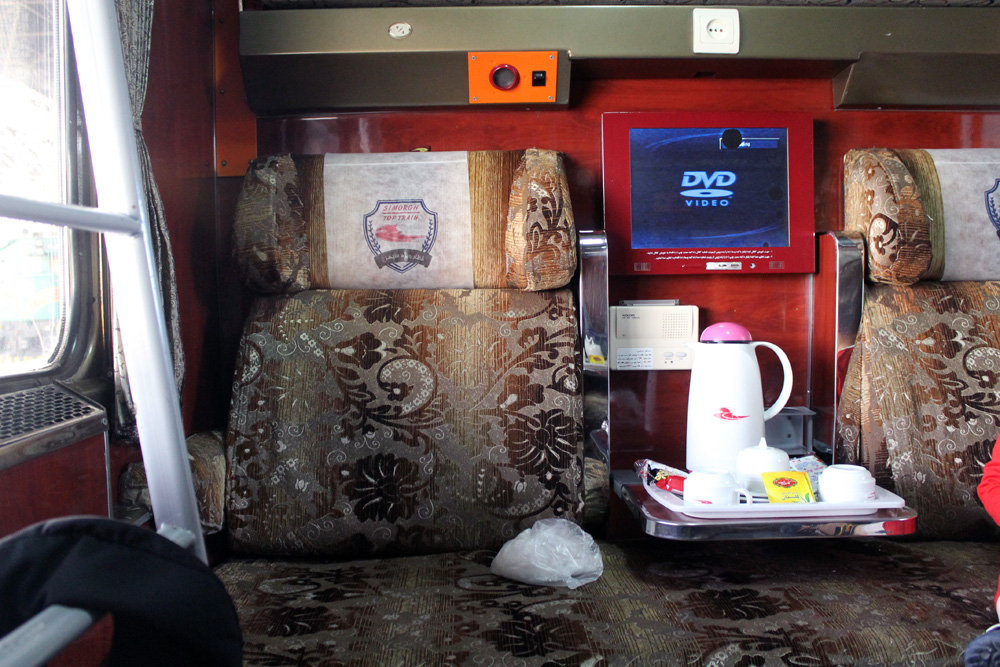
It was my first time to board on a night train in Iran. The compartment was clean. There were two sofas facing each other. On each side there was a small TV screen located in the middle of the wall. Below the screen a tray was hung separating the sofa. Overhead the sofa was a panel that would be used to support the bed. Electric plugs were also available. A stairs leaned on the window to climb the bed. It was a comfortable compartment for a night train.
The lady smiled at me, I smiled back. She put on a head cover just like me. She didn’t speak English but knew few words. I introduced my name. I told her that I was an Indonesian and my destination was Mashhad.
When the train was about to leave, two women in full hijab and black long dress came into our compartment. Their appearance was different from other Iranian people that I had met. Later I found out that they were of Hazara ethnicity. Again, I gave the same introduction to them. They smiled at me. They were mother and daughter who would travel for a pilgrimage to Mashhad.
As I didn’t understand the language, I could not open a conversation with them, so I just played with the little boy who seemed to enjoy playing with me.
Food
The train started to move and left Rah Ahan Station. There was not a lot to see outside the window, only some house buildings. The train would take around 10-11 hours to cover around 890-kilometer distance. So, I would arrive in Mashhad at 6 am the next day.
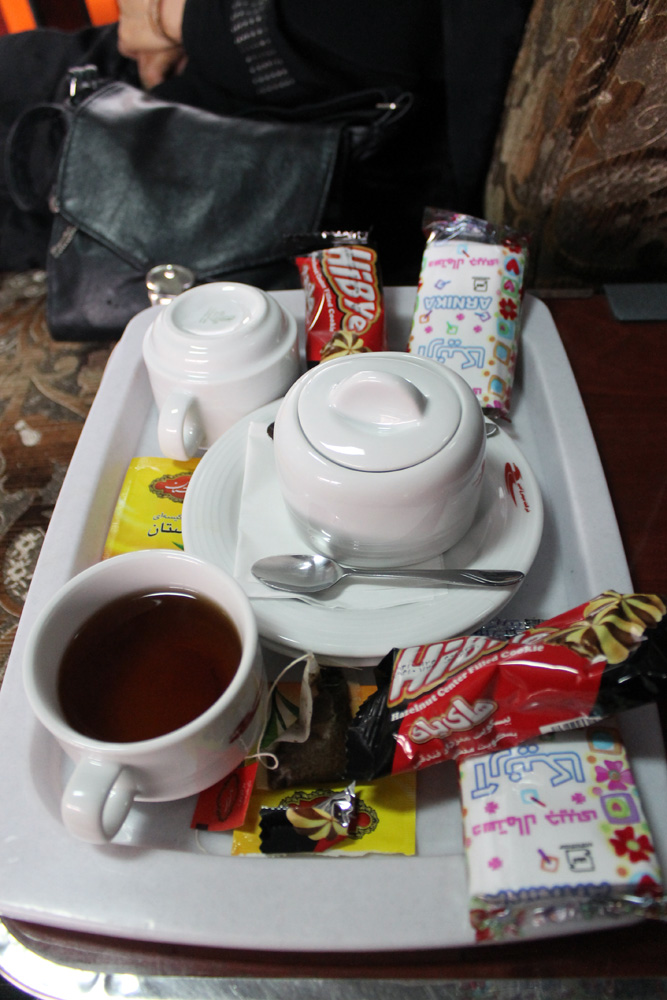
Then, a male train attendant knocked on the door. He came in and brought a tray. On the tray, there were ceramic cups, cup plates, and a sugar pot. In addition, there were small packs of biscuits, sachets of tea and coffee, and one big insulated water jug. I was a bit surprised with the service, because they used ceramic wares instead of plastic wares.
About one hour after leaving the station, the train stopped in the middle of the way. I was not sure why, but I guessed, it was because the azan (prayer call) called.
My companions on the train were hospitable. Despite the language barrier between us, I could sense their intention. The lady with the little son and the woman in black dress always shared whatever food they brought with us. I felt bad because I didn’t bring any food to share with them, only some biscuits. I really didn’t anticipate the situation.
Around 9 pm, the train attendant came again, this time he brought pillows and blankets, all were hygienic sealed in transparent plastic bags. As we were all women, he helped with setting up the bed. For sure, I and the daughter of the woman in black dress would sleep on the beds overhead the seats.
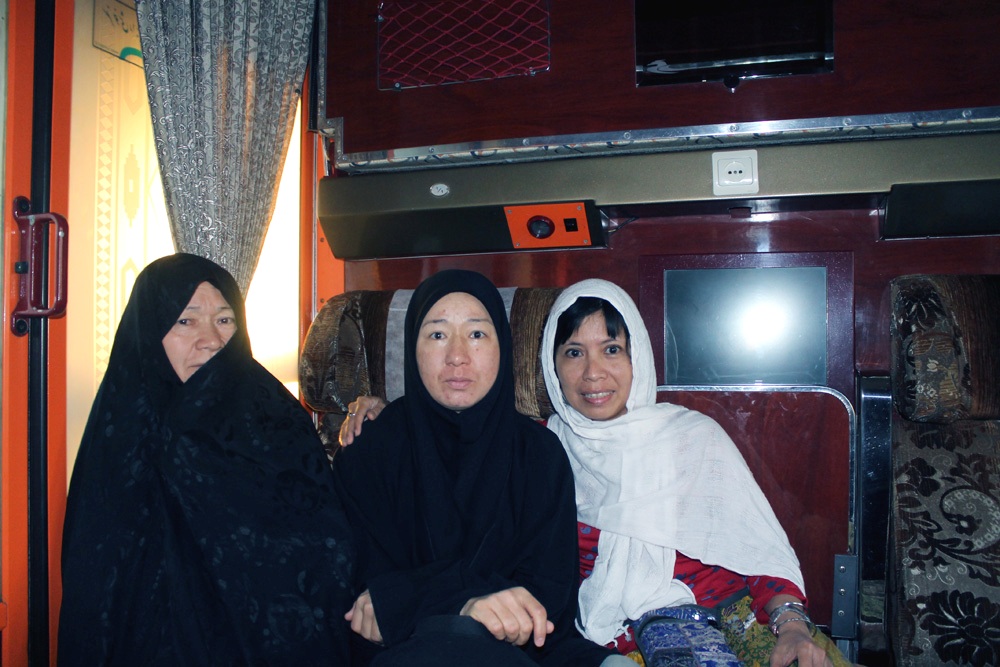
I received snacks from two sides, my stomach was full, and I even didn’t think of dinner. But when it was time for dinner, the lady insisted me to take the food she had. I took it as my respect to her genuine offer. As I finished eating my food, the woman in black dress, who was out when I was eating, also offered me her food. I said I was really full by rubbing my stomach. She kept insisting until the lady said I just ate. The woman in black dress looked disappointed. I wished I could have another bite, but my stomach was completely filled up.
I felt my night train trip was short because of the dynamic in my compartment. When it came to sleep time, I was climbing to my bed. All women took off their hijab and head covers without hesitation including the women in full hijab. They also took off their mantels/outer layers.
It was hard to sleep well when my bed was shaking as the train kept moving. I finally fell asleep and I was woken up when the train stopped. “Namaz,” the lady and the woman in black dress said when they were putting their dresses and head covers on. I just realized that the train stopped every azan time. I wanted to have the experience, so I came with them. We left the girl and the little boy who were sleeping soundly.
It was dawn and dark outside. I just followed my train companions who walked briskly to a small mosque in the station. They waited for me to return to the train. The train stopped more than 30 minutes and then continued the journey. When the sky was getting bright, the attendant knocked on the door, this time, he would take all the pillows and blankets.
“Neyshapur,” said the lady telling me about the city that the train was passing. We were close to Mashhad, I thought. Since I didn’t want to miss the morning view, I went to the compartment corridor to take some photos by the window. The hills were barren. It looked like a savanna ecosystem as I saw herds of lambs were grazing.
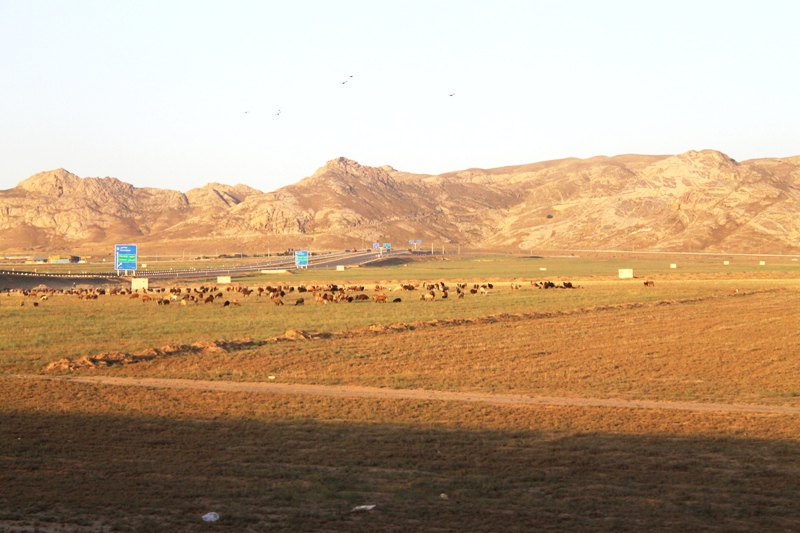
When preparing to get off, my hand dove into my bag and sensed two small packs. I was happy. I still had the last two small packs of Indonesian coffee. I gave each to the lady and the woman in black dress. I asked for having photographs with them, and they didn’t mind about that. We hugged each other to say goodbye as the train stopped at Mashhad station. I was astounded with what I experienced in my night train journey especially with my train companions whose names I forgot. They were just simple people with good hearts. It was one of my unforgettable journeys in Iran.

